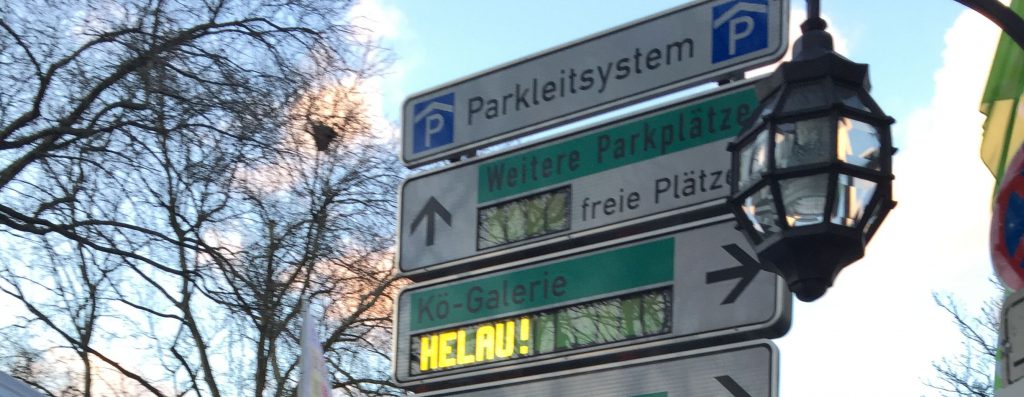Helau again! It’s time to celebrate Carnival again!
And for the celebration (almost) all of us will come to the office on Rose Monday. We can finally celebrate together again, dress up and toast to carnival.
The start date of the street carnival is different every year, always the beginning of the 5th season remains the same: Every year on 11th of November sharp at 11:11.
Why is it like this? Where does the carnival come from, why do we celebrate it at all? Which name is the correct one? What are the most interesting facts? And what terminology can be used? Here you can find all the information needed.
The cradle of carnival
According to Wikipedia, the “forerunners of the carnival were celebrated 5000 years ago in Mesopotamia”, in the form of a seven-day celebration after New Year. Here, the principle of equality was of particular importance – at that time, everyone was equal to each other, lords and servants, women and men. In addition, no one was allowed to be punished and food and drink were provided in abundance. These are the basic principles of Carnival up to this day. The Egyptians and other high-civilized folks also celebrated spring festivals in a similar form.
Carnival in Europe
Here in Europe, Carnival has only established from the Middle Ages with the ecclesiastical ritual of Lent. The first mention of Carnival – also called “Fastnacht” – can be found in the Speyer Chronicle from 1612, it reads: “In the year 1296 the mischief of Fastnacht began a little earlier (…)” In 1341 the word Fastelovend (from Cologne dialect: Fastnacht) is mentioned for the first time in the so-called Eidbuch of the city of Cologne. But what was the reason for the introduction of Carnival?
Before the beginning of the forty-day Lent, which begins with Ash Wednesday and continues until Easter, it is time to celebrate once again. This is also why the beginning of the street carnival almost every year is on a different date: It depends on the beginning of Easter time.
For the same reason, originally on 11.11. (Saint Martin’s Day) was celebrated a second, so-called “little” carnival, namely the one before the forty-day Lent before Christmas. From here comes the tradition that on 11.11. the “session” carnival in many areas begins, which is reserved for the ‘janz jecken’ (“completely foolish”) club carnivalists. In other German-speaking regions, Epiphany Day, i.e. the 6th of January, is the start of the carnival season.
The most interesting foolish facts
Three carnival strongholds mean not only different terminology, but also many different facts. Here we have collected the 11 funniest, most impressive or strangest facts about the fifth season and especially about Rose Monday:
- The Rose Monday processions start at 11:11 in Cologne and Mainz. In Düsseldorf, the procession starts at 12:22.
- With a length of 8.5 km, the Cologne Carnival procession route is the longest, followed by Mainz with 7.2 km.
- In Mainz, the entire procession length overhangs the route by almost 2 km.
- In Düsseldorf, the carnival procession moves through the city center at around 2.5 km/h.
- It can sometimes be expensive for knights, pirates, policemen, or soldiers if their costumes (or weapons) look too real.
- Cologne is the largest carnival stronghold in Germany. In 2025, around 12,500 people will take part in the Rose Monday procession. (Festival Committee for Cologne Carnival)
- In Mainz, the carnival flag (red – white – blue – yellow) is raised in the fifth season. According to legends, it is inspired by the French tricolor and goes back to the common history of the countries.
- Over 2000 glasses of Altbier are tapped every hour at Altweiber in Düsseldorf alone.
- Around 450 tons of camels are raining in Cologne and Düsseldorf on Rose Monday.
- According to the legislature, anyone injured by jecke throwing material is not entitled to compensation.
- Why the number 11 plays an important role in all carnival strongholds is not completely clear, but one explanation could be this: In the Middle Ages, the number 11 marked the “immoral” and the excessive. Perhaps this is why the great significance of the number in the German carnival comes.
You are not in one of the three strongholds of German Carnival, but you want to see the Rose Monday procession?
On 3rd of March from 9:30 a.m. the procession of Cologne will be broadcasted at WDR ( koeln.de), from 10:30 a.m. broadcasting of the procession in Mainzwill start at SWR ( Merkurist Mainz), and from 15 p.m. at the WDR again will be shown the Rose Monday procession in Düsseldorf (Carnival in Düsseldorf).
The right terminology: Carnival, Fasching or Fastelovend?
As already mentioned, we have three big carnival strongholds in Germany: Cologne, Mainz and Düsseldorf. Of course, many parts of the South Germany also celebrate Carnival, but in a different way. But what about Western Carnival?
In Kölle (dialect for Cologne), the Jecken celebrate Carnival, call out Alaaf and on Rose Monday it rains with camels. The Meenzer (dialect for Mainz) fools celebrate Carnival or Fassenacht with a triple thunderous Helau and there the weather report on Rose Monday often proclaims “cloudy weather with a view of Handkäs‘!” Here in Düsseldorf we cheer this year with a particularly loud Helau on the carnival processions.
But where do the terms actually come from?
Where does the word ‘carnival‘ come from? The most common assumption is that it is a derivative of the Middle Latin carne levare (take away meat) or carnelevale as a term for the Lent (time without meat). Very possible is also a translation of carne vale in the sense of meat, live well! (DWDS)
And why then Fastnacht? We know that during the 5th season it is about celebrating properly before Lent, so in the Rhineland-Hessian region the word Fastnacht has been derived from the middle-high German vas(t)(en)nacht. That used to mean “the night before fasting.” By the way, the word Fasching comes from vastschang (serving of the fast drink). So it can be said that this dazzling and colorful 5th season – no matter what you call it – has always to do with the subsequent Lent.

Helau or Alaaf?
Although the carnival greeting Alaaf is known throughout Germany – among other things due to the notorious television broadcasts of numerous Rhineland carnival meetings and processions – it is only proclaimed in the Rhineland. Alaaf can be traced back to the drinking slogan from the 15th century: “Al Aff” (meaning: Nothing goes over). Since the 19th century, the exclamation has been established: “Kölle alaaf!“, which means “nothing goes over Cologne”.
In Düsseldorf, on the other hand, as an exception to the Rhineland, Helau is called almost universally, and in the rest of Germany. Where this fool’s greeting comes from cannot be said exactly. Other carnival greetings have developed in numerous places, such as Narri-Narro in southern Germany.
Conclusion: We can see that there are many terms, all of which are correct and permissible. So there is no one “right” here: The carnival is as diverse as the German regions are and lives not only from the dialect, but also from the peculiarities of the inhabitants. That’s why there are as many names for the carnival as there are carnival strongholds.
Terminologically, there are no rejected terms, only preferred ones, depending on the region you are in.
And now the most important days...
The 11.11. (Beginning of Carnival), Carnival Thursday (Women’s Carnival night, where the woman has the power) and Rose Monday are the most important days of Carnival, at least here in the Rhineland :-). The day of the great carnival procession, which in some places can also take place on Tuesdays, is the highlight of the carnival and a big media event. But the real carnival takes place in the street and in the bars. Ash Wednesday is also important because the fun is over. Catholic Carnivalists receive the ash cross in the church and Lent begins.
In Cologne, a straw doll, called a nubbel, is traditionally burned on Tuesday at midnight, symbolic of all the sins of carnival or beyond. In Düsseldorf and Lower Rhine cities, the Hoppeditz (a fool’s figure) is carried to the grave for the same purpose. That is why in these areas, at the beginning of the carnival season, the Hoppeditz Awakening is celebrated.
There are countless myths and stories about Carnival, not only in the German-speaking countries, but in Europe and all over the world. There are so many that you can’t record them in a blog.
It is important that you now know through our blog where you should call which greeting.
If you want to know what your terminology can look like in your company and how to handle it correctly, you are in the right hands with us, because we are not only well versed in foolish terminology, but can also advise you on your terminology problem.
Get in touch with us to learn more about terminology management in your company!
Finally, we have our Carnival Office playlist for you – listen to it and join in 😉
The blc-Team wishes all fools a boisterous carnival time! And don’t forget: On Ash Wednesday everything is over!






